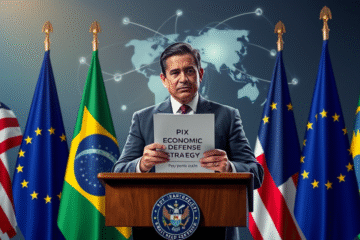Agribusiness Criticizes Political Crises and Tariffs
Political Crises have dominated the Brazilian agenda, bringing to light a series of criticisms and concerns from representative entities, such as the Brazilian Agriculture and Livestock Confederation.
In this article, we will explore the statement released by the confederation, which highlights the country's negative image on the international stage and discusses the paralysis caused by an obsession with the past.
In addition, we will address the political instability reflected in the imposition of tariffs, the relationship with the trial of former President Jair Bolsonaro, and the impacts on business relations and economic confidence in Brazil.
Central Criticisms of Government Institutions
The Brazilian Agriculture and Livestock Confederation expressed strong criticism of government institutions, highlighting the institutional misgovernance that permeates the current scenario.
Published on July 15, 2025, the note emphasizes the joint responsibility of the government, Congress and the Judiciary in the crises affecting Brazil.
With a critical view, the entity highlighted that the country became an international focus, not because of its opportunities, but because of political crises recurrent and by obsession with the past, which acts as a paralyzing factor for progress.
The note points out that the national politics is immersed in ideological disputes, deviating from their crucial economic obligations.
This scenario undermines the business confidence and the economic stability, reflected, for example, in the imposition of tariffs linked to the trial of former president Jair Bolsonaro in the STF.
During a meeting with the vice president, an attempt was made to discuss urgent solutions before the implementation of the new taxes on August 1st.
The confederation called for a reorientation of policy, indicating that it needs to break with the sterile agenda to restore economic predictability.
In short, the criticisms aim to reintegrate the country onto a path of shared vision and progress.
Impact of Crises on Brazil's International Image
The Brazilian Agriculture and Livestock Confederation stated that Brazil is known internationally for their political crises.
This negative perception overshadows the country's economic and social opportunities.
In the CNA statement, it is highlighted that the instability of the political scenario compromises not only the internal environment, but also the image of Brazil abroad.
This is evidenced by the visibility of crises in international media, which prioritize episodes of political turmoil, above economic reforms or social achievements.
A brief unnumbered list illustrates this contrast:
- Recurring political crises
- Economic instability
- Untapped growth potential
It is vital to recognize that while political crises tend to monopolize the headlines, Brazil has a wide range of investment opportunities and valuable natural resources.
However, for these opportunities to gain due attention, it is essential to have a realignment of political priorities to promote stability and trust.
Obsession with the Past: Political Paralysis
Impact on the Political Scenario A Brazilian Agriculture and Livestock Confederation expresses concern about the country's obsession with the past, which contributes to political paralysis and impedes necessary progress.
According to the Confederation, this fixation keeps Brazil stuck in outdated narratives and prevents important issues for economic development from advancing, resulting in stagnation.
A direct criticism was made:
The Brazilian economy cannot continue to be held hostage by political narratives that fuel extremes and paralyze decisions.
, as mentioned CNA expresses its position in an official statement.
Economic Consequences In addition to the political impacts, the obsession with the past is reflected in the economy.
The imposition of tariffs, associated with the trial of the former president, exemplifies this relationship.
Political instability generates insecurity and affects the international perception of Brazil, which begins to be seen less for its economic opportunities and more for its crises.
Many agricultural entrepreneurs are looking for solutions to avoid the implementation of new tariffs, whose discussion was discussed in a meeting with the vice president before the application of taxes.
A CNA highlights the effects of political crises, arguing that excessive attention to ideological disputes undermines both trust and economic stability.
Political Instability and Tariff Increases
The Brazilian Agriculture and Livestock Confederation, when releasing its note on July 15, 2025, directly linked political instability to the imposition of new tariffs by international authorities.
According to the Confederation, the trial of former President Jair Bolsonaro in the Federal Supreme Court (STF) has been a crucial factor in this increase in tariffs.
During the aforementioned trial, national politics became more focused on ideological disputes than on meeting the needs of economic needs of the country.
This ended up creating a scenario where the national economy began to be seen as vulnerable and unstable.
To illustrate the relationship between political events and the impact of tariffs, see the comparative table:
| Event | Date |
|---|---|
| Judgment in the Supreme Federal Court | 15/07/2025 |
| Implementation of tariffs | 01/08/2025 |
The imposition of these tariffs, also mentioned by Donald Trump in speeches, raises relevant concerns on the impact on Brazilian exports, which now face tariffs of up to 50%, the highest among the affected countries [50% Tariff: Brazil faces the highest rate among notified countries](https://g1.globo.com/economia/noticia/2025/07/10/tarifa-de-50percent-brasil-taxa-cartas-trump.ghtml).
Agribusiness entrepreneurs expressed their concerns in a meeting with the vice president, seeking solutions before the new tariffs were actually implemented.
It was highlighted in the note that this situation undermines business confidence and severely affects the economic stability, demanding an urgent political correction to overcome this crisis.
Ideological Disputes and Economic Impact
Ideological disputes in Brazil, as highlighted by the Brazilian Confederation of Agriculture and Livestock, have significantly undermined economic stability and business confidence.
National politics is intensely focused on ideological conflicts, which in turn destabilize the business environment and hinder economic progress.
These political tensions result in polarized economic decisions, such as tariff increases, which reflect political instability and are associated with events such as the Supreme Court's trial of former President Jair Bolsonaro.
This scenario increases the perception of risk in the business environment, leading to reduction in the level of investment and the distancing of potential international trading partners, as pointed out in several available analyses on the Brazilian diplomacy.
The following are the main evident economic losses:
- Fall in confidence: Businesspeople are wary of investing in a scenario of uncertainty
- Capital flight: Excessive politicization leads to investor withdrawal
- Loss of competitiveness: Brazil becomes less attractive for foreign trade, negatively impacting its position in global markets
Therefore, it is crucial that national policy adopt a more pragmatic stance.
This approach aims to recalibrate priorities and address pressing economic issues without ideology overshadowing the fundamental needs for growth and development.
Agro Meeting with the Vice President on Tariffs
In Brazil's turbulent political scenario, the meeting between agribusiness entrepreneurs and Vice President Geraldo Alckmin, held after the critical note issued by the Brazilian Agriculture and Livestock Confederation in 15/07/2025, emerges as a crucial step.
During the meeting, the imposition of new tariffs by the United States on Brazilian products was discussed, which threaten to come into effect in August 1st.
Businesspeople in the agricultural sector sought strategies from the government that contemplate the reversal or alleviation of this impact, highlighting the urgent need for coordinated action to protect the sector and, consequently, the national economy.
On a second date, efforts are focused on strengthening market confidence and creating conditions for a more stable and promising environment.
While the ideological disputes continue to occupy the political scene, the alliance between agriculture and the government could pave the way for solutions.
The commitment to finding solutions by the aforementioned deadline represents hope for the future of Brazilian agribusiness, with the expectation that diplomatic dialogue will bring tangible and favorable results.
In short, it is crucial that Brazil face its political crises with a focus on economic needs, seeking effective solutions to restore business confidence and economic stability.



0 Comments